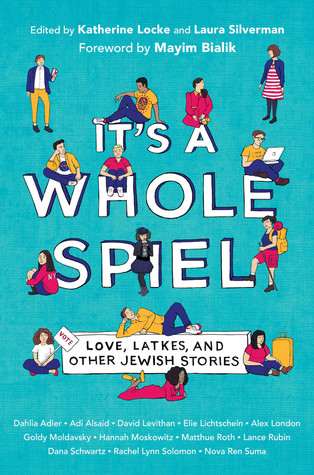 Jews have a long history in the United States, from the arrival of the first refugees from the Inquisition in New Amsterdam (now New York) in 1654. The following 350+ years have seen a growing diversity of national origins, philosophical strands, and ways of observing faith and expressing identity. The editors of the YA short story collection It’s a Whole Spiel: Love, Latkes, and Other Jewish Stories, Katherine Locke and Laura Silverman, have captured 14 snapshots of that diversity, entertaining stories that explore what it’s like to be young and Jewish in the U.S. (and in one case, in Mexico as well).
Jews have a long history in the United States, from the arrival of the first refugees from the Inquisition in New Amsterdam (now New York) in 1654. The following 350+ years have seen a growing diversity of national origins, philosophical strands, and ways of observing faith and expressing identity. The editors of the YA short story collection It’s a Whole Spiel: Love, Latkes, and Other Jewish Stories, Katherine Locke and Laura Silverman, have captured 14 snapshots of that diversity, entertaining stories that explore what it’s like to be young and Jewish in the U.S. (and in one case, in Mexico as well).
Many of the stories focus on the idea of “too Jewish” or “not Jewish enough.” Dahlia Adler’s “Two Truths and an Oy” portrays an Orthodox high school graduate at her university orientation, struggling to fit in with her non-Jewish and secular peers. In Lance Rubin’s “Chewbacca,” a secular Jewish boy whose father has converted to Buddhism falls in love with the daughter of a rabbi and has to fake his religiosity and knowledge at a Hanukkah party.
The Birthright trip – an all-expenses-paid trip to Israel designed to build loyalty and identity and perhaps above all, make sure Jews marry other Jews – is the subject of several stories. What happens when things go wrong and the connection isn’t made? Dana Schwartz’s “El Al 328” poignantly addresses that possibility, while Elie Lichtschein’s “He Who Revives the Dead” makes that trip the source of deeper personal growth for a girl afraid of the water ever since she nearly drowned in an episode of high school hijinks. The protagonist of Adi Alsaid’s “Ajshara” travels from his home in Mexico to escape the ghosts there, only to encounter different ghosts in Israel and elsewhere.
The authors also explore the diversity of family and romantic relationships among Jews today. The collection’s oldest contributor, David Levithan, describes a friend’s coming out that coincided with his having to run away from home twenty years earlier in “The Hold,” while Alex London’s “Indoor Kids” shows two boys falling in love under starlight while working as counselors at a Jewish camp today. Locke’s characters in “Some Days You’re the Sidekick, Some Days You’re the Superhero,” are cis, trans, nonbinary, and sometimes different people online from what they are in real life.
Many of these stories are laugh-out-loud funny, and serious topics are for the most part addressed with a light touch. While many of the characters may have grown up reading fiction heavy on the Holocaust, these contemporary stories don’t address anti-Semitism except for a brief mention in Silverman’s tale of a girl and boy sneaking away from a chaperoned Jewish youth group conclave to join an anti-gun protest. Awkward relationships abound, showing the universality of teen and young adult experiences across faith and identity. Still, the characters are either grounded in the traditions of their birth, exploring new ways of expressing their faith, and seeking out who they are on the cusp of adulthood.